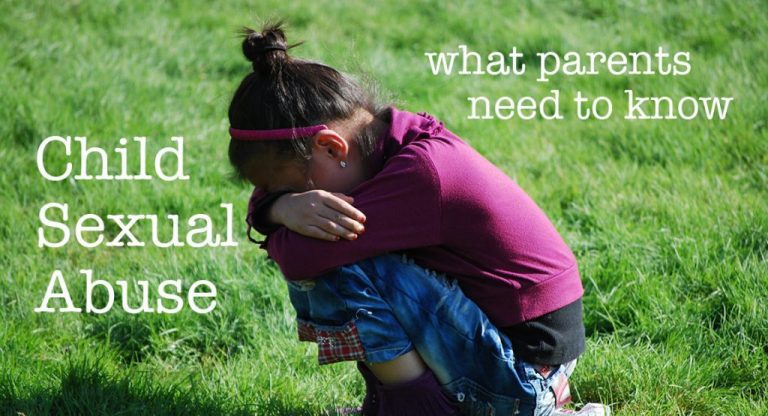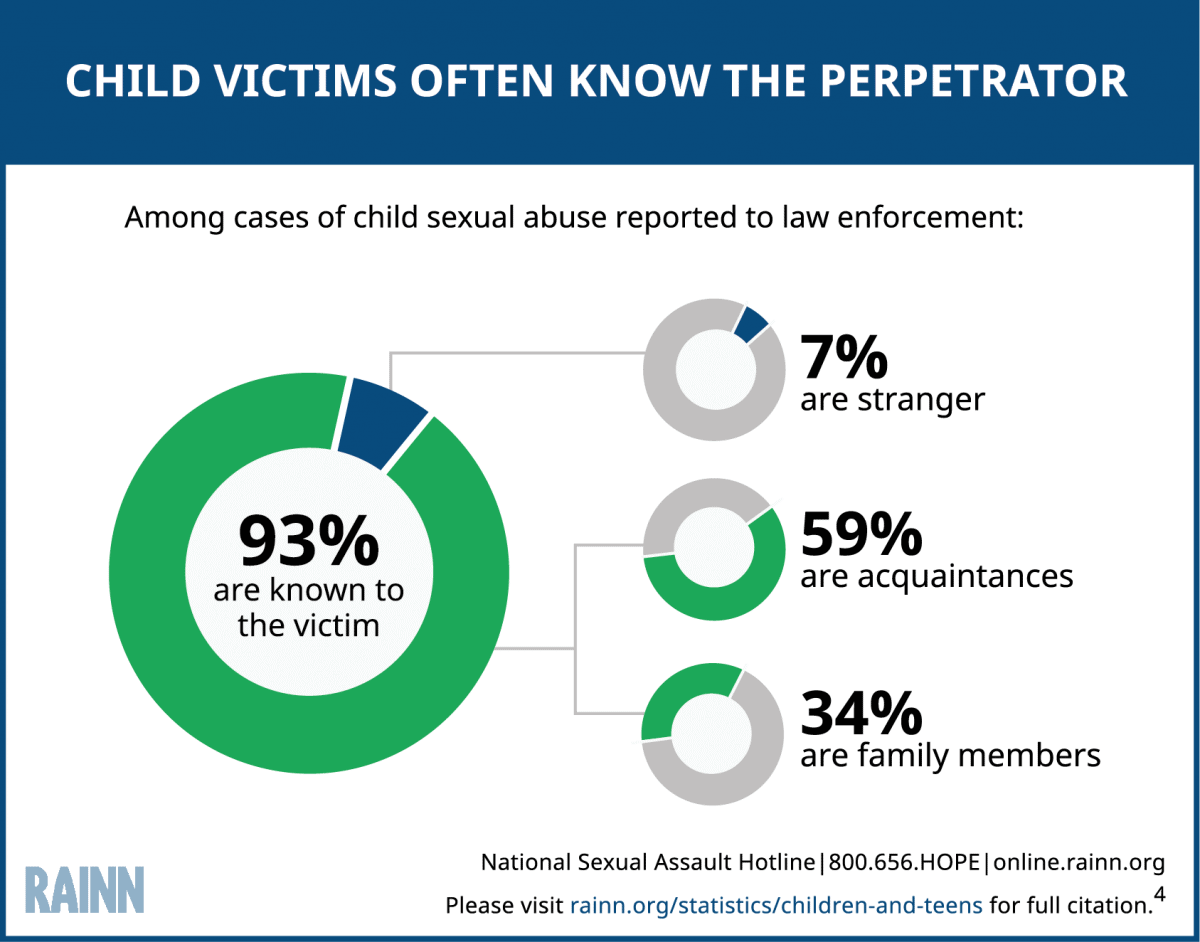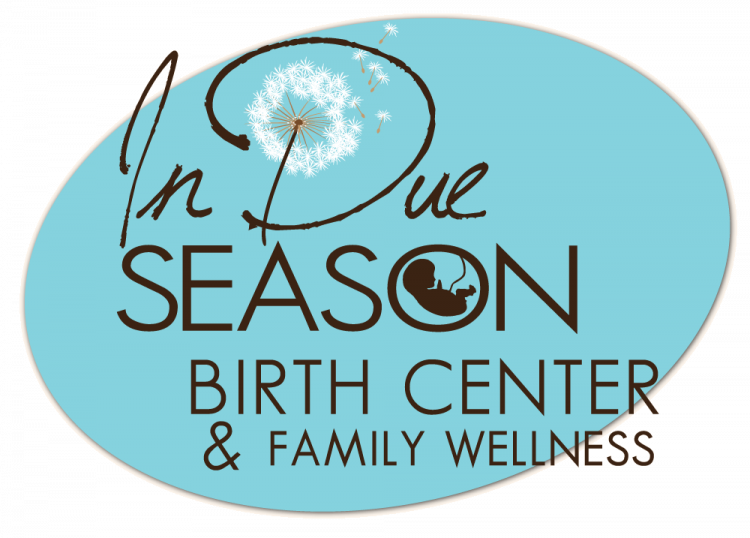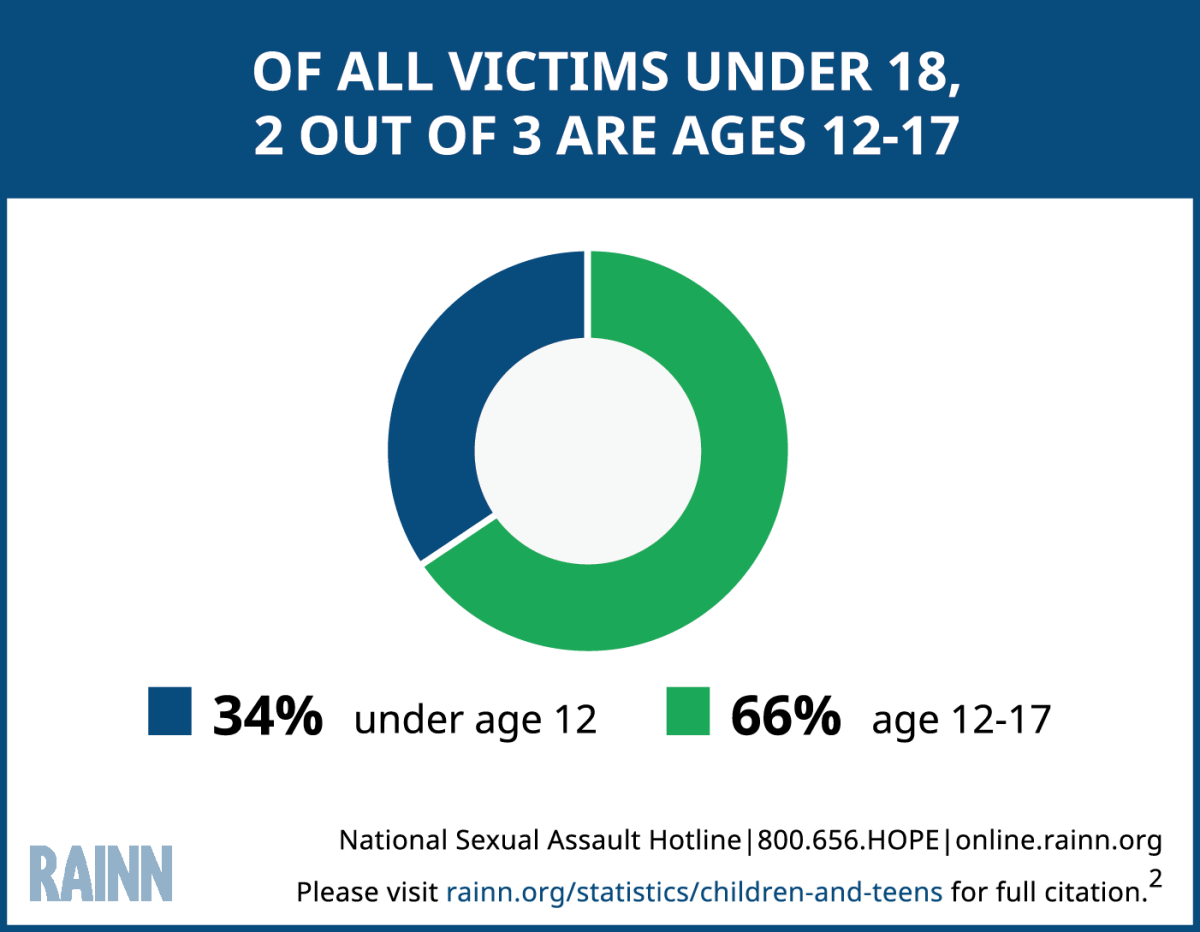
Because we are finishing up April, and it is Sexual Abuse Awareness month, I wanted to take the time to write a blog from a mom point of view. As many of you know, I am a mom of eight awesome children. 7 daughters, 1 son. As a survivor of child sexual abuse and a rape survivor, I have struggled to distinguish between protecting my children or being overprotective. Parents should be having a discussion even before their children are born on their ideas of how they can ensure this happens.

Stranger Danger? Probably Someone You Know.
Statistics show that most often it is a family member or a family friend who becomes the perpetrator. Only 7% of cases are committed by strangers. In my personal experience, it was a family member. By all accounts, it would have been very difficult for any adult in my life to conceive that my uncle could have been molesting me for nerly 5 years. I assume at some point there was suspicion, but nothing was ever done. I was only 8 years old when my mother died and that is when the molestation finally ended. I realize my story is not uncommon; I can only wish it were. My story does not end there, I was a a child sexual abuse victim for several years after that at the hands of several family members. I wonder if someone had been paying closer attention, or if someone who had been courageous enough to confront my abusers, could it alll have been avoided?
Distractions
Some of you may be reading my story and thinking, “What was her mother and father doing at the time? Weren’t they paying attention?” From birth to age 8, my mother was either battling cancer or working two jobs to feed four children. She loved us, but due to socio-economic circumstances and sickness, she was unable to be a doting mom who could give us the individual attention that children need. So when my uncle filled in my need for attention at age 3, everyone was busy keeping my mom alive to analyze the situation. Unfortunately, children born into low-income families where mother and/or father are either absent or working all the time are particularly suseptible to sexual predators.Sexual Predators Often Seek Out Wounded Prey
Another aspect of all this that I wanted to point out, is that it is statistically proven that many children who have been a victim, often find themselves in very familiar situations repeatedly throughout their lives. I am an example of just that. I was placed in foster care at the age of 12. In the 17 different foster homes and group homes I was placed in, I was sexually abused in 6 different homes at the hands of caretakers, their family members, or other foster children. In the event that your worst nightmare does take place and your child is victimized, your child is 35 times more likely to be victimized again according to these government statistics. I don’t say this as a fear factor, I say this because your child needs you to be hyper-vigilant in watching over them. They need your help to overcome and no longer feel like a victim but rather a survivor!Different Types of Predators
I, unfortunately, encountered different types of predators during my childhood and adolescent years. Here is a list.- Groomers – build trust with the child/adolescent, give gifts and attention, replacement for missing relationships such as an absent father. Makes child believe that what is happening is “ok” or “good” or “an expression of love”. Warp the child’s sense of right and wrong. Jerry Sandusky, former football coach at Penn State, is an example of a groomer.
- Dominators – ready to resort to violence to make the child/adolescent do what they want, give orders and threats (ie. threaten to kill them or parents, cause physical pain, slander the victim if they report it).
- Thrill-seekers – want to “get away with it”, quick and hidden, child may not even realize they are being touched until it is already done.
- Victim-to-abuser – former or current victims of child abuse can sometime mimic the behavior and become the abuser to a younger child. While we want to sympathize with them and help, be vigilant about wanting to “rescue” these children from their circumstances. If it means you are placing your own children in potentially compromising situations, it might be best to leave it to professionals. Beth Thomas was an extreme case. According to smart.gov, adults who are child sexual abusers were more likely to have been exposed to sexual violence, sexual abuse, emotional abuse, and neglect as a child as well.
 Date rape – prevalent in high schools and colleges. Taking advantage of someone who is drunk/passed out/high, either voluntary or involuntary, and unable to say “no” or defend themselves. Also, girls in compromising situations can be overpowered and forced into non-consensual sex. (i.e. “She wanted it” “She’s easy anyway”, “You owe me”) Teenagers who are hanging out with older adults or college-age groups can be particularly vulnerable to this type of abuse. 66% of all child sexual abuse happens to our teenagers aged 12-17 (mostly female). It’s so important to continue to have open dialogue with your older children who are exerting his/her independence and warn them about compromising situations. Read more about teen date rape.
Date rape – prevalent in high schools and colleges. Taking advantage of someone who is drunk/passed out/high, either voluntary or involuntary, and unable to say “no” or defend themselves. Also, girls in compromising situations can be overpowered and forced into non-consensual sex. (i.e. “She wanted it” “She’s easy anyway”, “You owe me”) Teenagers who are hanging out with older adults or college-age groups can be particularly vulnerable to this type of abuse. 66% of all child sexual abuse happens to our teenagers aged 12-17 (mostly female). It’s so important to continue to have open dialogue with your older children who are exerting his/her independence and warn them about compromising situations. Read more about teen date rape.
Why don’t kids tell?
- “If you tell, we won’t be able to play anymore.”
- It’s the only person paying attention to them.
- “I won’t be your friend anymore.”
- “They won’t believe you.”
- “They will think you’re bad and dirty.”
- “I’ll kill you or your parents/siblings.’
- Perpetrator convinces child that it’s normal and healthy.
What do I, as the parent/caretaker, need to do to prevent child sexual abuse?
- Trust your intuition. The experiences of my childhood have made me keenly aware of my surroundings and the people around me. There are things we as parents should be aware of. First and foremost never dismiss your intuition. If you have a feeling that someone cannot be trusted with your child, then DO NOT trust them with your child. Statistics show that most often it is a family member or a family friend who becomes the perpetrator. In my personal experience, this was the case. A parent should be on alert at all times, whether you are out in public, the comfort of your own home or at a family function at a relative’s house.
- Keep a watchful eye on your children. Children get distracted and often don’t think about dangers until it’s too late. Know where your kids are, what they are doing, and who they are with at all times. Be cautious about the people your children are around, you may feel that you know the children your child is friends with, however unless you also have a friendship with your child’s friends parents, you can not be certain of what is happening when your child is at their home or on outings with them.
- Get out of your comfort zone and get educated. The more you know, the more information you can pass on to your children. Children are innocent, they do not think about the dangers of life the way we do as parents. Pass on to the next generation the wisdom that is necessary to keep them safe.
National Sexual Violence Resource Center
How can you communicate the dangers of child sexual abuse with your children?
You’re not talking about sex, you’re talking about personal safety. Be clear and open about it. You can use other safety issues as a segway into the more “uncomfortable” topics.- Teach your children to trust their own feelings and instincts. They need to feel that it’s ok to say “no” and to be rude to people in order to protect themselves. Better to be rude and wrong, than end up in a compromising and/or dangerous situation.
- Teach them about “good touch, bad touch”. You can refer to a bad touch as where their bathing suit covers them. Use the proper anatomical words for the body parts they need to protect.
- Make sure they know that keeping secrets is not only wrong, but dangerous. Make sure your children know to tell you if something does happen, or even if someone just makes them feel uncomfortable. If you don’t teach these things to your children, then you could be leaving them open for a predator to teach them whatever they want, and even force them to keep secrets. Details are important, let your child know some phrases that a perpetrator might use such as “no one will believe you” or “they will think your dirty”. There are many, many more. If your child knows the tactics of perpetrators they will not fall for the lies.
- Listen to your children. Dictating, preaching, and demanding are all negative ways to talk to your children. Remember that they are just small people with thoughts and ideas of their own. Even very young children need to be able to tell you their feelings, thoughts and fears. Bed time and family dinner is an excellent time to make your children feel heard. Take them seriously if they mention something and don’t accuse them of lying. Ask questions of others and look for evidence if an incident is suspected.
- Read to your children about safety. There are many books on the subject that make talking with your children much easier. A couple of my favorites are:
Body Safety Education: A parents’ guide to protecting kids from sexual abuse by: Ms Jayneen Sanders
NO Trespassing – This Is MY Body! by: Pattie Fitzgerald
- Teach your children how to react in the event that a stranger approaches them. For my children, I kept a whistle on my children when they were young and we were in crowded places such as Disney or other theme parks. If they got lost, they knew to stand in a crowded, well lit area and blow the whistle until I or my husband found them. They knew that if someone approached them and tried to take them anywhere, they were to sit on the ground, curl in a ball and scream “you are not my mom/dad”!!! And continue this until a “safe” person was nearby, such a police officer or a person with the store manager badge. Even then, they knew not to go anywhere with anyone unless I or their Dad were there and agreed.

 Date rape
Date rape